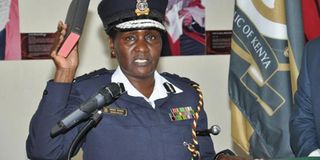‘We are trying, but not there yet’

Deputy IG Grace Kaindi takes oath of office when she became a member of the National Police Service Commission in June 2013. FILE PHOTO | ZAKHEEM RAJAN
What you need to know:
- Deputy IG says morale is high and that the service is better now compared to previous years.
- Corruption is a national problem, and in the force, perception is higher due to traffic police, who are a minority, says Kaindi.
What are the successes and challenges confronting the police service and has there been progress compared to how officers conducted their affairs before the reforms? To find answers to these and other similar questions, Nation reporter Fred Mukinda talked to the Deputy Inspector-General of the Police, Ms Grace Kaindi.
Question: In your opinion, are police reforms working?
Answer: Comparing the police of yesterday, we are now miles ahead. Look at arrests. Police cannot hold a suspect for more than 24 hours without taking him or her to court. Look at vetting. Officers who were found unsuitable are no longer in service.
Question: Is morale in the police service good?
Answer: We cannot talk about morale without looking at the welfare of officers. Every officer has a life insurance cover. All stations have vehicles unlike before. We have a provisional medical insurance for officers and their dependants and we are in the process of negotiating for another better one. We cannot say we are there yet but we are working on it. So the morale is good.
Question: Are you containing corruption?
Answer: Corruption is a problem of Kenyan society and police is part of it. Any officer found and proven of engaging in corruption is prosecuted and dismissed from service. But unlike other departments, corruption is visible within the police because they are on the roads. With this I mean the traffic police who are not more than 300. The biggest unit under me is the GSU. The GSU are more than 4,000 and nobody says they are corrupt and that is true.
Question: Are relations with the DCI ok?
Answer: The Directorate of Criminal Investigations is our smaller brother. I have spent a lot of my time in service in the CID. The relationship is very okay.
Question: Are you sharing resources, such as the police college and uniforms?
Answer: We share facilities like colleges. For instance at the police staff college in Loresho, we are training officers from all services including the AP and DCI.
Question: How is the integration of the AP going?
Answer: The mandate of the AP and Kenya Police are different and this is captured in National Police Service Act. The APs’ work is paramilitary in nature while the KP is generally the civil police. When it comes to a joint operation, all officers take orders from one commander irrespective of service after which they fall back to their legal and different mandates.
Question: Have officers been assigned new ranks to your satisfaction?
Answer: Right now I need more AIGs to head directorates and other formations. We also need to have more CPs to head the counties so that we don’t have SSPs in command of officers of equal rank.
Question: Why are there undeployed senior officers?
Answer: We do not have any senior officers who are not holding office.
Question: Why are junior officers doing big jobs?
Answer: We have some CPs heading directorates after their seniors who are AIGs retired. We also have SSPs heading counties instead of CPs. This matter is being addressed but is partly being delayed by ongoing vetting. The SSPs heading counties need to be promoted but this cannot be done until they have been vetted by the National Police Service Commission.
Question: Is there command confusion especially in the counties?
Answer: It’s not confusion but in some situations we have officers commanding those of equal rank. The promotions will be made after vetting and the matter will be solved.
Question: Is the service top heavy? Have you ever considered retrenching?
Answer: No. I even need more senior officers, that is AIGs at the top to replace those who have retired and also to head key formations and directorates.
Question: Would you say there is favouritism in promotions/new ranks?
Answer: When it comes to determining who is promoted, the issue of favouritism crops up and it is human nature. But I can assure you that any decision to promote is made on merit. However, we have to consider tribal, gender and regional balance as dictated by law.




